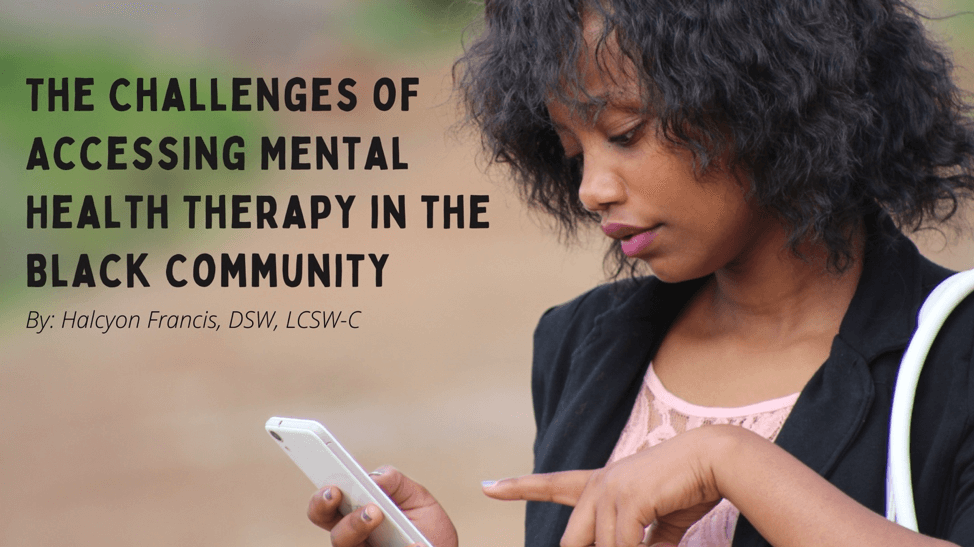Happy Mental Health Awareness Month, everyone! I have been a mental health clinician for 20 years, in various settings, serving primarily people of color. From working in outpatient community mental health centers, hospitals, school systems, and to now owning a private practice, it has been evident to me that the challenges faced by communities of color when it comes to accessing mental health treatment are consistent across the board. In this article, I will highlight for you some of the barriers to mental health access experienced by marginalized communities.
Finances
Let’s begin with the most obvious barrier that people face when wanting to do an activity to improve their lives: Money! Mental health therapy can be costly. In some cases, private insurance companies will cover most of the cost of a visit, but a co-pay is still due at the time of service to the clinician. I’ve seen co-pays as high as $55.00 per session, which can be cost-prohibitive, particularly if a client is attending therapy sessions weekly. If a person doesn’t have insurance, they would have to pay out-of-pocket for sessions, which can range anywhere from $60-$200 or more depending on where a client lives. Out-of-pocket sessions are not an option for many people, therefore the discussion of the affordability of therapy services continues to be an important topic. While individuals covered under certain state funded programs do not have to pay for mental health services, there are very few private mental health therapists who accept state medical insurance as a form of payment. Therefore, many clients typically left with the option of going to community mental health clinics that are often overcrowded with perhaps even a waiting list.
Time
Most people work for a living. If a person is employed full-time, this often requires therapy sessions to be scheduled in the evenings or on weekends. Those slots are filled quickly, often leaving availability only on weekdays before 4pm. Generally, only those who work from home, are retired, or are part-time employees can attend therapy sessions during the day. But even if a client can procure one of those coveted time slots, attending therapy still means blocking out a minimum of two hours every week. Unfortunately, many people just don’t have the additional time or enough support in the area of child-care to attend therapy sessions regularly.
Stigma
Even with all the recent hype from Black celebrities like Taraji P. Henson and Charlamagne tha God about the importance of mental health treatment, there is still a stigma attached to the concept of mental health in communities of color. As a clinician, I am often told by Black clients that their families warned them about the “dangers” of coming to therapy or that their pastors told them that the only safe place to express their feelings is to an assigned church member. Family support is crucial and having a spiritual life is also important, but there is a sense of relief one gets when talking to someone who is unbiased and who can just listen without offering their advice or a scripture (although there are trained therapists who can do the latter too).
Access to Clinicians of Color
A lot of people in the Black community that I encounter prefer Black therapists. They want someone who comprehends our cultural nuances and recognizes the nonverbal cues that only we can understand. BIPOC (Black, Indigenous, and People of Color) therapists don’t get much media exposure beyond self-promotion, but we are here. Clients might have to take a deep dive to find us, particularly if they’re looking for one with a specialization, but we are certainly available if they prefer us. Mental health therapy is about putting yourself first. If you’ve been through trauma, feel ashamed, or if you just want to talk about someone who irritates you at work, it’s all important and worth discussing. Mental health therapy is one of the best self-care activities a person can do for themselves and BIPOC clinicians are here to help.
While this is not an exhaustive list of the challenges members of communities of color encounter when trying to access mental health treatment, it’s certainly a starting point. The lack of financial resources, time scarcity, the stigmatization often associated with therapy, and the limited visibility of BIPOC clinicians are all obstacles that should be considered when discussing why many people do not seek the assistance needed to live, healthy and enriching lives. Hopefully, some of these issues can be discussed in bigger forums and addressed as the conversation surrounding mental health treatment in communities of color continues to grow. Stay tuned for my next WDC blog post where I will offer some tips for addressing these issues. I hope you get a chance to check it out and again Happy Mental Health Awareness Month!
About the Author

Dr. Francis provides mental health therapy services for clients ages 17 and older. This includes individual and family sessions. She has expertise in working with clients who have a history of depression, anxiety, and low self-esteem due to experiencing various traumas. She also specializes in working with women who have been diagnosed with Pre-menstrual Dysphoric Disorder (PMDD). Dr. Francis is currently in training to become a certified Brainspotting therapist and offers this treatment modality to all patients.

